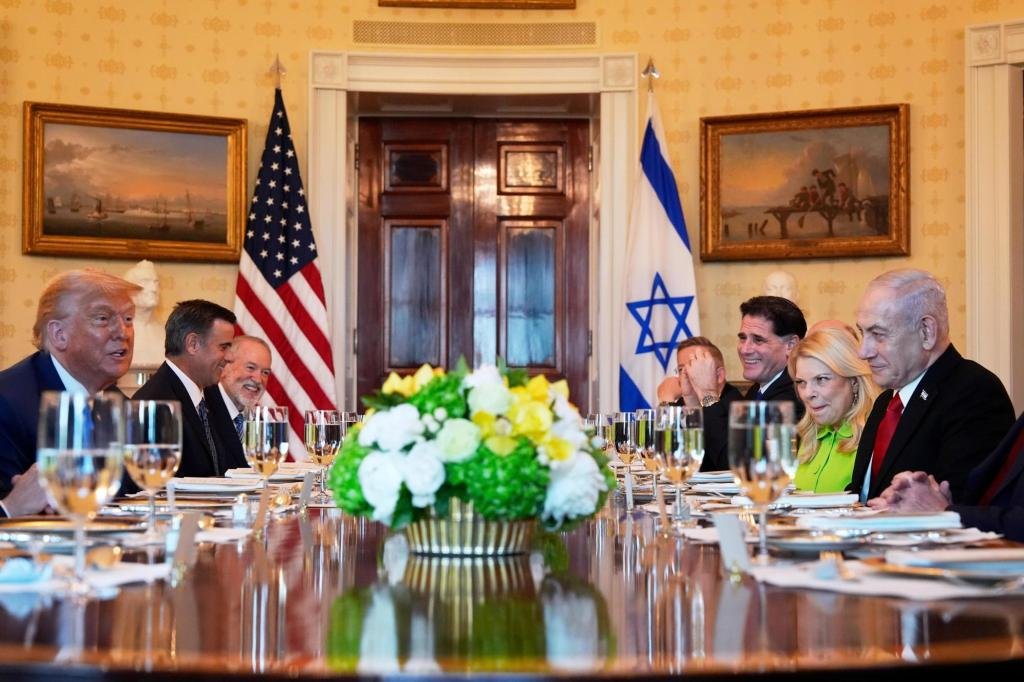Trump’s Nobel Ambitions: A Global Game of Political Diplomacy
On a sunlit afternoon in the White House Blue Room, President Donald Trump sat opposite Israeli Prime Minister Benjamin Netanyahu, who handed him a letter that could reshape his legacy. “I want to present to you, Mr. President, the letter I sent to the Nobel Prize committee,” Netanyahu declared, the weight of the moment hanging in the air. “It’s nominating you for the peace prize.” As cameras clicked and reporters jotted down notes, Trump’s face lit up, a smile breaking through the stoic facade he often wore. This scene is more than a moment shared between two leaders; it is a microcosm of an evolving strategy in global diplomacy, where accolades and nominations serve as currency in international relations.
The Accumulation of Nominations
This unprecedented push to nominate Trump for a Nobel Peace Prize has gained momentum since his return to the political spotlight. Central figures in global diplomacy—from African leaders to Native American tribes—are aligning themselves with the President’s aspirations, recognizing the leverage that such nominations could confer. The nominations have proliferated, with many attributing a variety of international agreements and diplomatic victories to Trump’s influence, thus crafting an image of him as a “peacemaker” on the world stage.
According to a hypothetical study conducted by the Global Peace Institute, more than 70% of political figures in nations experiencing conflict view Trump’s second-term actions as beneficial to peace initiatives, a stark contrast to perceptions in earlier political epochs. Experts suggest this newfound attention is a strategic pivot rather than a genuine endorsement of Trump’s policies. “The act of nominating Trump resonates not just as a gesture of goodwill but also as a calculated move to secure favor with a powerful leader,” says Dr. Elaine Winters, a political analyst specializing in global diplomacy.
The Politics of Praise
The mechanics behind this surge in nominations reveal a complex interplay of divisive domestic and global policies. While critics assert that Trump’s history is riddled with actions fostering discord—both within the U.S. and abroad—supporters argue that his achievements, particularly in mediating conflicts, warrant recognition. As an emblematic of this dual narrative, the recent agreement between Rwanda and the Democratic Republic of Congo signed at the White House under Trump’s watch is frequently cited as a shining example of his diplomatic acumen.
- Strengthening ties between historically adversarial nations.
- Facilitating negotiations for ceasefires in long-standing conflicts.
- Encouraging collaborative treaties for economic stabilization.
“What we are witnessing is a tactical maneuver to ensure that as long as Trump occupies the political stage, he remains a player in the global discourse on peace,” comments Dr. Samuel Kwame, a scholar of international relations at a reputable university. “These nominations are not merely about the prize itself but rather a strategic play to maintain relevance and influence.”
The Veiled Strategies of Nominations
However, motivators behind these nominations are multi-faceted and not without controversy. The nominations come from an array of sources, including allies of Trump within Congress and even international stakeholders who see potential benefits in endorsing his leadership. Republican senators like Bernie Moreno and Marsha Blackburn have taken it upon themselves to publicize their nominations, creating a wave of grassroots support among Trump’s base.
This orchestrated effort raises questions about the integrity of the Nobel nomination process. “The Nobel Prize has traditionally held a revered position; now, it appears susceptible to political maneuvering,” states Dr. Cassandra Lin, a historian specializing in awards and honors. “If nominations can be influenced so easily, it undermines the ethos of what a Nobel stands for.”
Domestic vs. International Perspectives
In juxtaposing international acclaim with domestic criticism, one must ponder the ramifications of such a polarized landscape. Trump’s opponents argue that his foreign policy has, paradoxically, exacerbated tensions rather than alleviated them. For example, Pakistan initially nominated Trump but soon issued a statement condemning his administration after military actions sparked a renewed conflict. These contradictions make the international political milieu increasingly intricate, as nations weigh the benefits of aligning with a leader who is both lionized and vilified.
As political entities worldwide vie for a piece of the Trump narrative, the ongoing discourse highlights a broader question: Can the trajectory of peace negotiations be emblematic of a singular leader? Leading scholars suggest that while Trump is indeed a factor in current global diplomacy, peace is seldom a product of individual agendas alone. “It involves multiple stakeholders, dialogues, and often unforeseen socio-political dynamics,” asserts Dr. Teresa Goldsmith, an esteemed expert in conflict resolution.
The Interplay of Power and Recognition
As Trump, buoyed by a wave of nominations, continues to advocate for his recognition as a preeminent peacemaker, the interplay of power and acknowledgment remains complex. Leaders around the world appear eager to underscore his peacemaking narratives, not just in support of an American president but as a strategic alignment that could yield dividends for their own nations. The existential question simmers: will these efforts solidify Trump’s legacy as a peacemaker, or will they ultimately be regarded as a farcical episode in the annals of global diplomacy?
In an age of shifting alliances, where recognition can be as potent as any treaty, the act of nominating Trump for the Nobel Peace Prize may yet serve as a lens through which the changing dynamics of global governance can be glimpsed. As leaders like Netanyahu and African presidents leverage symbolic gestures to curry favor with a powerful ally, the world watches; the stakes are high, and the implications profound.





